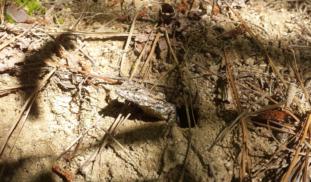Please wait...
About This Project
The decision of where to nest is perhaps the greatest one a lizard can make for her offspring. Many lizards dig nests in open, sunny spots because warm temperatures help lizard embryos grow and survive. However, climate warming is raising temperatures at those nest sites to the point they may soon become harmful and even lethal to lizard embryos. This project investigates whether lizards can choose shadier, cooler places to nest, which could buffer offspring from effects of climate change.

Browse Other Projects on Experiment
Related Projects
Satellite tracking the secret lives of vulnerable juvenile Loggerhead sea turtles off Morocco’s Coast
This pioneer project marks the first time in Morocco's history for satellite transmitters deployed on sea...
Out for blood: Hemoparasites in white-tailed deer from the Shenandoah Valley in Northern Virginia
Our research question centers about the prevalence and diversity of hemoparasites that infect ungulate poplulations...
Cyanova: A modular, budget photobioreactor for the efficient cultivation of microalgae
Microalgae are overlooked constantly as a protein source because of it's high costs and complex maintenance...


